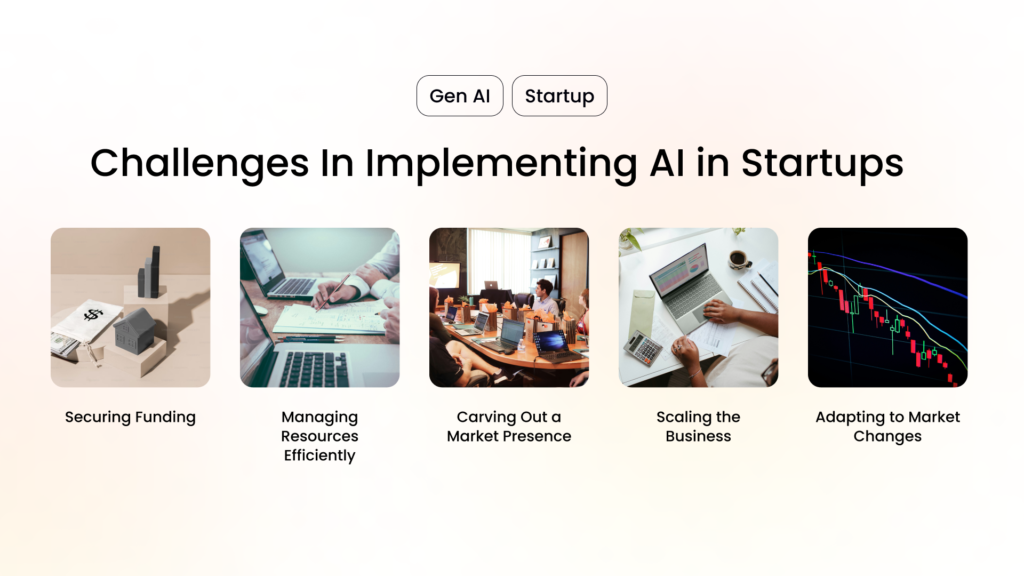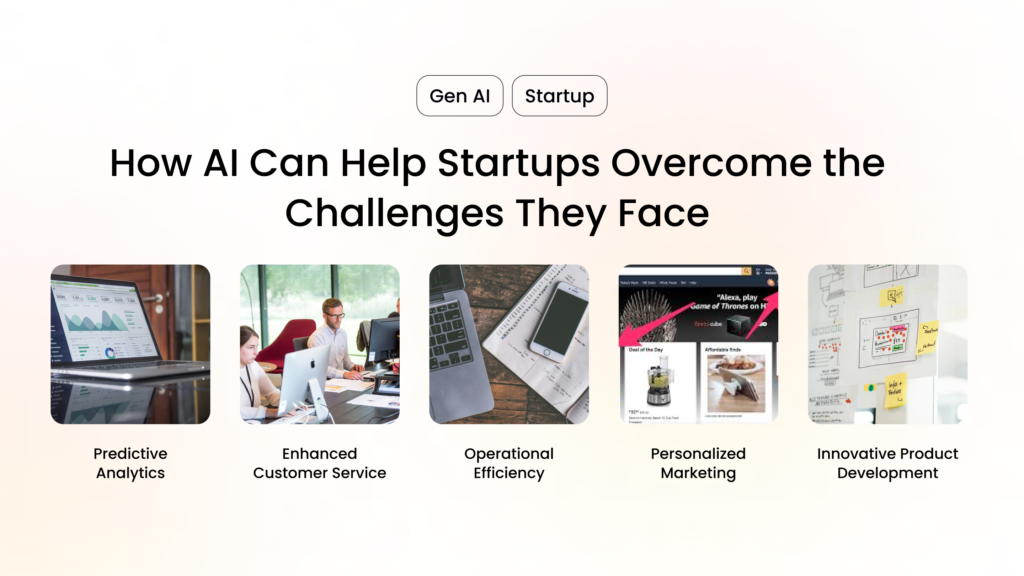As we step into 2024, the startup ecosystem is poised for transformative changes. In this in-depth exploration, we delve into what 2024 holds for businesses, focusing specifically on AI in Startups.
With rapid technological advancements and evolving economic landscapes shaping the future, we are at a crucial juncture in history. AI is not just a tool but a significant force driving innovation and growth in the dynamic business environment.
An Overview
In the current entrepreneurial landscape, startups are in a prime position to harness the power of Artificial Intelligence (AI), effectively transforming it from a mere buzzword into a crucial cornerstone of their business strategies.
AI extends startups an unmatched array of capabilities, including the automation of mundane tasks, the personalization of customer experiences, and the streamlining of operations, thereby acting as a formidable ally for emerging businesses aiming to establish their presence in highly competitive markets.
By integrating AI into their core operations, startups can optimize their efficiency and innovate in ways previously unimaginable, setting new industry standards and pushing the boundaries of what’s possible in their respective domains.
Challenges In Implementing AI in Startups
The journey to startup success is filled with a variety of challenges that test the resolve of even the most steadfast entrepreneurs. These challenges include, but are not limited to:

- Securing Funding: In a marketplace teeming with competition, obtaining financial backing is a significant hurdle. Entrepreneurs must navigate through a crowded field of contenders, presenting their visions compellingly to attract investors.
- Managing Resources Efficiently: With often limited initial capital, startups must maximize every dollar. This includes careful budgeting, lean operations, and strategic allocation of funds to ensure longevity and growth.
- Carving Out a Market Presence: Establishing a foothold in an industry dominated by giants is daunting. Startups must differentiate themselves, offering unique value propositions to carve out a niche controlled by well-established players.
- Scaling the Business: As the startup grows, scaling up operations presents its own challenges. Each growth stage requires meticulous planning, from expanding the team to entering new markets. This necessitates not just hard work, but strategic foresight and innovation.
- Adapting to Market Changes: The ability to anticipate and swiftly adapt to market changes is crucial. This demands a deep understanding of the market dynamics, customer behavior, and emerging trends to stay ahead of the curve.
- Continuous Evolution and Resilience: Success is not merely about offering a valuable product or service; it involves continuously evolving, enhancing offerings, and overcoming obstacles with resilience and creativity. Entrepreneurs must be prepared to pivot their strategies in response to feedback and market shifts.
Navigating these challenges requires hard work, strategic planning, innovation, and a robust ability to anticipate and adapt to rapid market changes. Overcoming these hurdles with resilience and creativity is essential for achieving lasting success in the competitive startup landscape.
How AI Can Help Startups Overcome the Challenges They Face
The potential of AI in revolutionizing startup operations and scaling businesses is immense. By harnessing the power of AI, startups can unlock new levels of efficiency and innovation, propelling their growth in competitive markets.
AI automates mundane tasks and provides deep insights into market trends, customer behavior, and operational inefficiencies, enabling startups to make informed decisions and adapt quickly to market changes.

- Predictive Analytics: AI’s predictive analytics can forecast market trends, helping startups to stay ahead of the curve. By analyzing data patterns, startups can anticipate customer needs and adjust their strategies accordingly.
- Enhanced Customer Service: Through AI-powered chatbots and virtual assistants, startups can offer 24/7 customer service, improving response times and customer satisfaction. These tools can handle many queries simultaneously, freeing up human resources for more complex issues.
- Operational Efficiency: AI can streamline operations by automating routine tasks, such as inventory management and administrative duties. This automation reduces human error and allows the startup team to focus on strategic growth activities.
- Personalized Marketing: AI enables hyper-personalized marketing campaigns by analyzing customer data to understand preferences and behaviors. Startups can tailor their messaging and offers to match individual customer profiles, significantly improving engagement rates.
- Innovative Product Development: AI can analyze customer feedback and market demand to guide startups in developing innovative products and services. By understanding what consumers want, startups can create solutions that meet market needs and stand out.
AI Technologies Employed by Startups for Enhanced Operational Efficiency
Artificial Intelligence (AI) and Generative AI are increasingly becoming indispensable tools in the business landscape. According to a report by McKinsey, 50% of companies have adopted AI in at least one business function, highlighting its significant impact on operational efficiency and innovation.
Furthermore, the use of Generative AI has surged, with applications in content creation, design, and decision-making processes, showcasing its versatility across industries. Startups, in particular, are leveraging AI technologies to gain a competitive edge, employing tools such as Machine Learning (ML), Natural Language Processing (NLP), and Robotics Process Automation (RPA).
These technologies automate routine tasks, provide advanced analytics for strategic decision-making, and enhance customer experiences, proving instrumental in achieving greater operational efficiency and driving business growth.
Use Cases of AI in Startups Across Departments
AI is revolutionizing company operations, with a 2022 Deloitte survey revealing that 93% of companies believe AI will be a pivotal technology to drive innovation and efficiency.
In marketing, AI analyzes customer data to personalize campaigns, increasing engagement by up to 35%. In HR, AI-driven analytics streamlines the recruitment process, reducing hiring times by 50%. Finance departments leverage AI for real-time fraud detection, reducing false positives by 60%.
Use cases in various departments:
- Marketing:
- Personalized customer engagement based on behavior analysis.
- Targeted advertising campaigns using customer data insights.
- Social media analytics for better audience understanding.
- Dynamic content creation tailored to individual preferences.
- Human Resources:
- Automated screening of candidates to identify the best fits.
- Employee engagement and satisfaction analysis.
- Talent management and succession planning using predictive analytics.
- Onboarding process automation for new hires.
- Finance:
- Real-time transaction monitoring for fraud prevention.
- Automated risk assessment and management.
- Predictive analysis for financial forecasting.
- Streamline invoice processing and payment operations.
- Customer Service:
- AI chatbots for 24/7 support, reducing response times.
- Personalized service recommendations based on customer history.
- Automate the ticketing system for faster issue resolution.
- Sentiment analysis to gauge customer satisfaction.
- Operations:
- Predictive maintenance to prevent equipment failure.
- Supply chain optimization for cost reduction and efficiency.
- Automated inventory management using AI algorithms.
- Workflow automation to improve productivity and reduce manual errors.
Ethical Considerations Associated with Creating and Deploying AI in the Context of Startups
The advent of AI technologies brings to the forefront many ethical concerns, notably in privacy, data security, and bias. The immense capabilities of AI to process and analyze data can inadvertently compromise user privacy, pose security risks, and perpetuate biases if not carefully managed.
To mitigate these risks, startups should prioritize the development of AI with ethical considerations at the core, ensuring transparency in AI operations, implementing robust data protection measures, and actively seeking to eliminate biases in AI algorithms. Establishing and adhering to strict ethical guidelines is crucial in fostering trust and maintaining the integrity of AI technologies.
Best Practices for Successful Implementation of AI and ML in Startups
Successful AI implementation in startups goes beyond just using cutting-edge technology; it starts with a clear strategy that aligns with the startup’s goals and user needs. This crucial step ensures AI deployment is effective and cost-efficient.
By understanding the startup’s objectives and user requirements from the start, businesses can choose the most beneficial AI tools. This strategic approach saves resources and ensures investments in AI deliver real results.
Selecting the right tools is key and involves evaluating various AI technologies to find those that address the startup’s unique challenges. This process is streamlined by the initial strategy, guaranteeing a perfect fit for the startup’s needs.
Creating a culture of innovation and learning is also essential, enabling teams to experiment with AI, learn from outcomes, and continuously improve. This approach supports the iterative development of AI models, promoting creativity and keeping teams updated on AI advancements.
Regular evaluation and refinement of AI models are crucial to maintain their value over time. As the startup grows and user needs change, AI solutions must be reassessed and tweaked. This ensures AI continues to align with the startup’s goals and meets user needs effectively.
Successful AI implementation requires a well-understood strategy focused on the startup’s goals and user needs. This foundation ensures AI investments are effective and cost-efficient, driving growth and innovation in line with the startup’s mission and values.
The bottom line
The future of startups is inextricably linked with the evolution of AI, especially as we look toward 2024. Emerging trends such as AI democratization, advances in AI explainability, and the integration of AI with other technologies like blockchain and IoT, highlight the necessity of AI for startups to succeed.
The era of AI-driven startups is upon us, marking a new paradigm where efficiency, innovation, and ethical considerations merge to propel startups toward unprecedented success. As the landscape changes, AI is the compass guiding startups through uncharted territory into a future full of possibilities.
At Innovators Hub Asia, our AiLab service is your gateway to revolutionizing business operations and decision-making through advanced AI technologies. As a leading AI consulting firm, AiLabs provides a comprehensive suite of services that include crafting bespoke AI strategies, prototyping concepts, and implementing full-scale AI systems tailored to your organization’s unique needs.
Whether you’re onboarding AI for the first time or looking to validate AI capabilities before making a large-scale investment, AiLabs offers expert guidance and custom solutions. With AiLabs, you can confidently navigate the complexities of AI and unlock new avenues of growth and efficiency.
Ready to revolutionize your business operations today? Contact Innovators Hub Asia to scale up your business in the age of AI.






